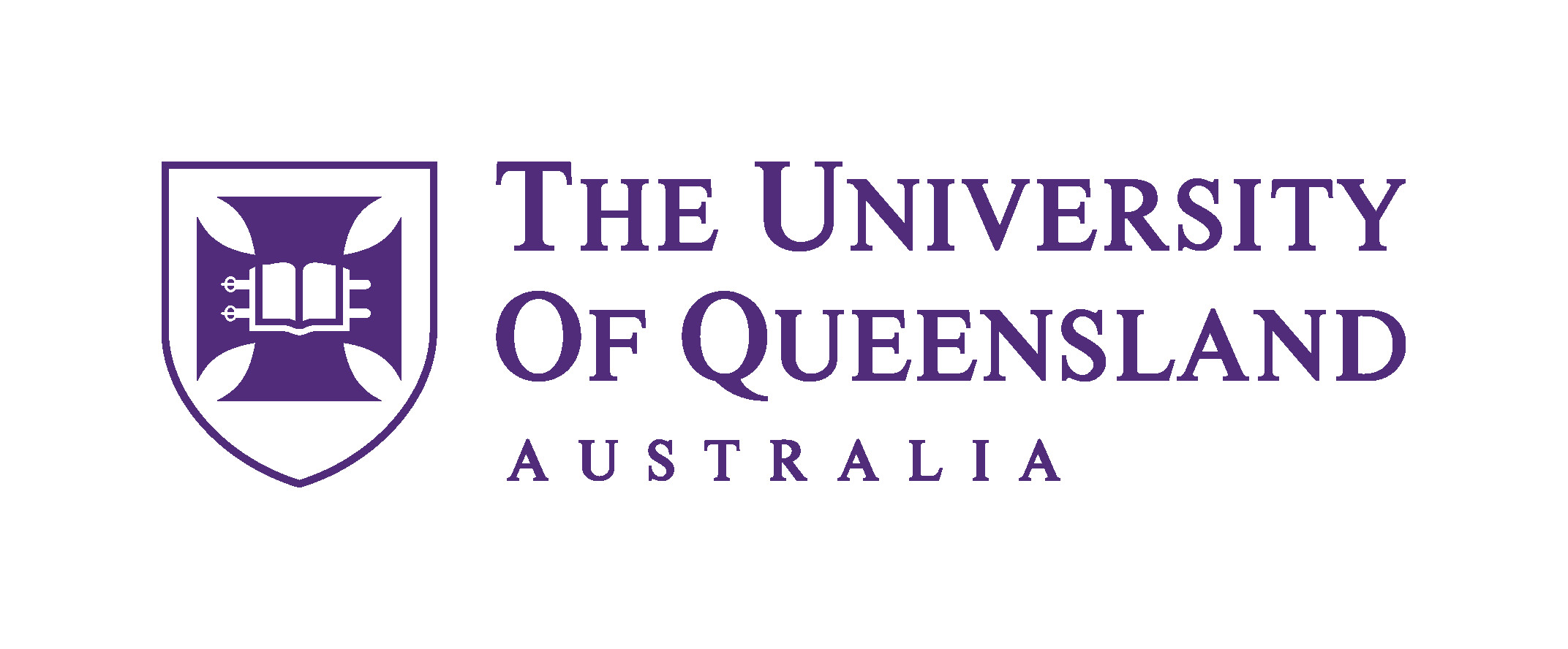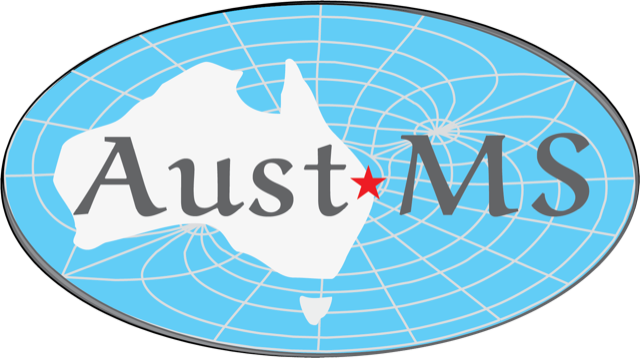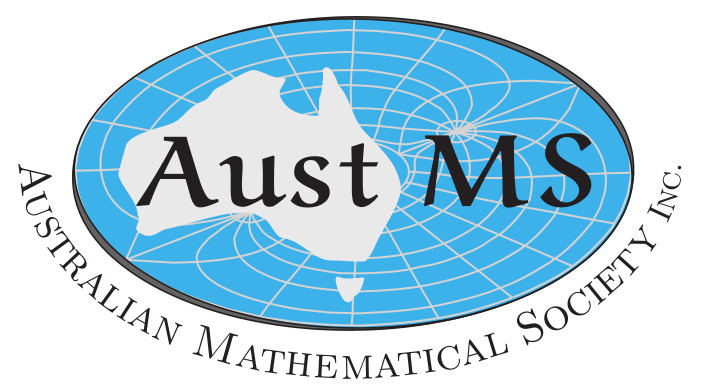The 67th Annual Meeting of the Australian Mathematical Society
![]()
Date: 5-8 December
![]()
Duration: 4 days
![]()
Venue: The University of Queensland, St Lucia Campus
Conference schedule and booklet
Schedule-At-A-Glance (PDF, 2.3 MB)
Short Timetable (PDF, 33.6 KB) (updated Nov 28, 2023)
Program and Abstracts Booklet (PDF, 3.6 MB) (updated Dec 07, 2023)
You may also log into the AustMS 2023 registration system for an interactive timetable. On the upper-left corner click on "Conference Info", and choose the "Timetable" option from the drop-down menu.
Conference events
The following conference events are currently being planned:
Conference Dinner
Date and Time: 6pm, Thursday 7 December (drinks will be served from 6pm and food at 7:30pm)
Venue: Hillstone, Carawa Street, St Lucia, Brisbane
Free transport from UQ provided
Women in Mathematics Special Interest Group (WIMSIG) Dinner
Date and Time: Monday 4 December, from 6:30 pm
Venue: Customs House, 399 Queen Street, Brisbane
Registrations for this event have now closed. The venue has advised that the air-conditioning at Customs House does not suit everyone and some guests may find it more comfortable to bring a jacket.
Women in Mathematics Special Interest Group (WIMSIG) Business Meeting
Date and Time: Monday 4 December, 4 – 5 pm.
Venue: UQ St Lucia, Building 61A – Brian Wilson Chancellery, Senate Room or via Zoom.
LGBTQIA+ and Allies Lunch
Date and Time: Wednesday 6 December, lunchtime
Venue: UQ St Lucia, Science Learning Centre (Room 240), Priestley Building (Building 67).
Education Afternoon
Date and Time: Wednesday 6 December, 13:30 -- 17:00
Venue: Room 401, Building 69 (69-401)
Organisers: Poh Wah Hillock and Michael Jennings
The Education Afternoon is a long-standing tradition at the Society’s annual meeting. It brings together high-school maths teachers and academics for an afternoon of practical and thought-provoking discussions in maths education. This year, we have a panel comprising first-year undergraduate students, high-school maths teachers and academics to discuss the first-year mathematics experience, a workshop on action research led by Merrilyn Goos, Professor of Education at the University of Sunshine Coast, and a statistics workshop led by Dr Michael Bulmer, The University of Queensland. Registration for the Education Afternoon is free, and afternoon tea will be provided.
Note to high-school teachers: If you were unable to register using the registration link, please email Michael Jennings (msj@maths.uq.edu.au) or Poh Hillock (p.hillock@uq.edu.au) to let us know you'd like to attend.
Sponsor presentations: Optiver
Tuesday 5 December, 12:45 -- 1:15 pm
- Venue: UQ St Lucia, Room 200, Advanced Engineering Building (Building 49).
- Title: The Data Evolution: Careers Through Time
- Speaker: Virginia Wheway, Head of Data Strategy, Optiver
Thursday 7 December, 12:45 -- 1:20 pm
- Venue: UQ St Lucia, Room 101, Abel Smith Building (Building 23).
- Title: Insight into Optiver: Where Maths Can Take You in Industry (interactive Q&A session)
Sponsors
The AustMS 2023 conference is sponsored by




Special thanks to Enrico Valdinoci and George Willis for supporting the WIMSIG dinner with their ARC Laureate Fellowship funds.
Please email austms2023@uq.edu.au to discuss how you can make a charitable gift or sponsor a conference social event.
Early-bird rates are available until the 15th of October.
The deadline for abstract submission is November 05th.
Financial Support
AustMS WIMSIG Cheryl E. Praeger Travel Awards
These awards are designed to provide full or partial support for women, trans and gender diverse mathematicians based in Australia to attend conferences or to visit collaborators, with approximately eight domestic Travel Awards and four international Travel Awards awarded annually.
closing date: October 01, 2023
AustMS WIMSIG Anne Penfold Street Awards
These awards provide additional financial support to Australian mathematicians for their caring responsibilities, while they travel for conferences or research visits to collaborators, with approximately four Awards awarded annually. The potential uses of these Awards include, but are not limited to, short-term childcare or professional carers for elderly relatives.
closing date: October 01, 2023
Student Support Scheme
This scheme is to support student members of the Australian Mathematical Society, studying at an Australian university, who attend the annual conference and present a talk, and who reside outside the capital city in which the conference is being held.
closing date: October 01, 2023
Plenary Speakers
- Peter Bartlett (UC Berkeley)
- Holger Dullin (University of Sydney) [ANZIAM Lecturer]
- Camillo De Lellis (Institute for Advanced Study, Princeton)
- Eleonora Di Nezza (Sorbonne) [Hanna Neumann Lecturer]
- Poh Wah Hillock (The University of Queensland)
- Takashi Kumagai (Waseda University)
- Sarah Peluse (University of Michigan) [Early Career Lecturer]
- David Ridout (University of Melbourne) [ANZAMP Lecturer]
- Marcy Robertson (University of Melbourne)
- Colva Roney-Dougal (University of St Andrews)
- Jason Sharples (UNSW Canberra) [Dr Yunupingu Lecturer]
- Guofang Wei (UC Santa Barbara)
- Stephen Wright (University of Wisconsin)
Peter Bartlett (UC Berkeley)
Peter Bartlett is Professor of Statistics and Computer Science at UC Berkeley and Head of Google Research Australia. He is a graduate of the University of Queensland. He has served as Associate Director of the Simons Institute for the Theory of Computing at UC Berkeley, and since 2020 he has been Director of the Foundations of Data Science Institute and Director of the Collaboration on the Theoretical Foundations of Deep Learning. He is President of the Association for Computational Learning, Honorary Professor of Mathematical Sciences at the Australian National University, and co-author with Martin Anthony of the book Neural Network Learning: Theoretical Foundations. He was awarded the Malcolm McIntosh Prize for Physical Scientist of the Year in Australia in 2001, was chosen as an Institute of Mathematical Statistics Medallion Lecturer in 2008, an IMS Fellow and Australian Laureate Fellow in 2011, and a Fellow of the ACM in 2018, and was elected to the Australian Academy of Science in 2015.
Holger Dullin (University of Sydney) [ANZIAM Lecturer]
Holger Dullin is a Professor in the School of Mathematics and Statistics at the University of Sydney. He did his PhD at the Institute for Dynamical Systems in Bremen in 1994 under the supervision of Peter Richter. He was a PostDoc in Boulder, became a Lecturer in Loughborough, and joined the University of Sydney in 2008.
The research interests of Professor Dullin are Dynamical Systems and Mathematical Physics, ranging from classical to quantum, from ODEs to PDEs, from integrable to chaotic, and from pure mathematics to real world applications. Recent highlights of his research include contributions to the classification of integrable systems, new insights into the non-rigid body dynamics of springboard diving, and a stability result in the 3-body problem.
Camillo De Lellis (Institute for Advanced Study, Princeton)
Camillo De Lellis is the IBM von Neumann Professor at the Institute for Advanced Study in Princeton. He wrote his doctoral dissertation in 2002 under the supervision of Luigi Ambrosio at the Scuola Normale Superiore di Pisa and, before joining the Faculty of the Institute, he was professor at the University of Zuerich from 2004 till 2020. He has been a plenary speaker at the European Congress of Mathematics at Krakow in 2012 and at the International Congress of Mathematicians in 2018. He is the recipient of the 2013 Fermat Prize (jointly with Martin Hairer), the 2014 Caccioppoli prize, the 2020 Bocher Prize (joint with Larry Guth and Laure Saint-Raymond) and the 2022 Maryam Mirzakhani prize of the National Academy of Sciences. He is active in the fields of calculus of variations and he is an expert in geometric measure theory, but he has also worked on elliptic partial differential equations and on partial differential equations in compressible and incompressible fluid dynamics.
Eleonora Di Nezza (Sorbonne) [Hanna Neumann Lecturer]
Eleonora Di Nezza works at the interface of several domains such as complex and differential geometry and algebraic geometry; and more precisely in Kähler geometry. She got her Ph.D, joint between Università di Roma TorVergata (Italy) and Université Paul Sabatier (France), in 2014. Her thesis was rewarded by two prizes.
After the Ph.D, she got a postdoc of 3 years at Imperial College London where she was Marie Curie Fellow. During this period she was also selected for a postdoc position during a special program in Differential Geometry at MSRI (Berkeley) where she spent a semester.
She got her first permanent job as Maître de Conférence at Sorbonne Université in 2018. She then paused the job in order to be able to start the position of Professeur Monge at École Polytechnique (2020-2022).
In 2021 she was awarded the "Médaille de Bronze du CNRS". The Bronze Medal rewards the first works of young researchers specializing in their field. At the end of 2021 she also got the HDR (Habiltation à dirigerer des recherches): this is a necessary qualification to become full professor in France. She then got a Full Professor position at Sorbonne Université started in September 2022.
Poh Wah Hillock (The University of Queensland)
Poh Hillock is 2022 Australian University Teacher of the Year. She obtained her PhD in Pure Mathematics from The University of Adelaide in the area of Convex Sets with Lattice Point Constraints, after which she taught at the Nanyang Technological University, Singapore. In 2012, she joined The University of Queensland (UQ) teaching large first-year mathematics courses. She is Director of First Year Mathematics at UQ and a Senior Fellow of the Higher Education Academy. By leveraging high impact practices, such as differentiated and collaborative learning, Poh has built a comprehensive support network to help first year mathematics students bridge the gap between high school and university. A key element is Poh’s award winning Support Learning Tutorial which recognises students’ unique learning needs. Since 2018, Poh has led the successful transformation of UQ’s first year mathematics courses, delivering flexibility and high value on-campus learning experiences.
Takashi Kumagai (Waseda University)
Takashi Kumagai is a professor of mathematics in the Faculty of Science and Engineering at Waseda University in Japan. He specializes in probability theory and stochastic processes, and his research focuses on anomalous diffusions on disordered media, such as fractals and random media. Kumagai completed his PhD at Kyoto University in 1994; after working at Osaka University and Nagoya University, he accepted a position at Kyoto University in 1998. He was a professor at the Research Institute for Mathematical Sciences (RIMS) at Kyoto University till 2022, in particular he was the Director of the institute in 2020-2022. He then moved to Waseda University.
Kumagai was an invited speaker at the 2014 ICM in Seoul, and gave a Medallion Lecture at the Conference on Stochastic Processes and their Applications in Moscow in 2017. His awards include the Spring Prize of the Math. Soc. of Japan (2004), JSPS Prize (2012), Inoue Prize for Science (2017), Osaka Science Prize (2017) and Humboldt Research Award (2017).
Sarah Peluse (University of Michigan) [Early Career Lecturer]
Sarah Peluse works in analytic number theory and arithmetic combinatorics, and is especially interested in questions in higher-order Fourier analysis and additive number theory. She is an assistant professor at the University of Michigan and earned her PhD from Stanford University in 2019.
David Ridout (University of Melbourne) [ANZAMP Lecturer]
David is a mathematical physicist and pure mathematician at the University of Melbourne. He has previously worked at Adelaide, ANU,Murdoch and UWA, as well as DESY Hamburg, and the Universities of Laval University (Quebec), McGill andMontreal. His research interests centre around two-dimensional conformal field theory, including vertex operator algebras, their representation theories, exotic modular forms and nonsemisimple generalisations of modular tensor categories.
Marcy Robertson (University of Melbourne)
A/Prof. Marcy Robertson finished her PhD in 2010 at the University of Illinois-Chicago under the supervision of Professor Brooke Shipley. Marcy was a postdoc at the University of Western Ontario in Canada and at Université Lille 1 in France and worked at University of California, Los Angeles before moving to the University of Melbourne in 2015. She is currently an ARC Future Fellow and Associate Professor at University of Melbourne.
Marcy’s research is broadly in the discipline of algebraic topology. Her interests include the theory of operads, homotopy theory, and higher category theory. Current research focuses on applications of operads to low dimensional topology and geometry, focusing on the underlying structure that unites topology, geometry and quantum algebra.
Colva Roney-Dougal (University of St Andrews)
Colva Roney-Dougal is a group theorist, and is particularly interested in questions with a combinatorial, computational or geometric flavour. She did her PhD at Queen Mary, University of London, under the supervision of Peter Cameron. Her thesis was on a question in finite permutation groups, and her PhD was awarded in 2001. After that, she worked for two years in the Computational Algebra group at Sydney University. During this time she classified the primitive permutation groups of degree up to 1000 (later extended to 4095): the resulting libraries of primitive permutation groups in Magma and GAP are used by researchers across group theory and combinatorics.
Colva then moved to the University of St Andrews, Scotland, initially to the School of Computer Science, before returning to Mathematics in 2005. Since then she has remained at St Andrews, where she is now a Professor of Pure Mathematics, as well as Director of the Centre of Interdisciplinary Research in Computational Algebra, and Head of Pure Mathematics. In 2013 she classified the maximal subgroups of the almost simple finite classical groups in dimension up to 12, jointly with John Bray and Derek Holt, and the resulting book has become a standard reference, with over 500 citations to date.
Alongside her work as a pure mathematician, Colva has an extensive record of public engagement, including more than 10 appearances on “In Our Time” on BBC Radio 4.
Jason Sharples (UNSW Canberra) [Dr Yunupingu Lecturer]
Jason Sharples is a mathematical scientist and internationally recognised expert in wildfire behaviour and development. He is Professor of Bushfire Dynamics at the University of New South Wales, Canberra. Professor Sharples earned a doctorate in mathematics in 2001, under the supervision of Robert Bartnik.
Professor Sharples uses mathematical, statistical and computational models to understand the dynamics of wildfire propagation and to identify geographic features and weather conditions more likely to generate extreme wildfires. His research has extensively influenced policy and practice in Australia and internationally. In 2022 he was elected as a Fellow of the Australian Academy of Technological Sciences and Engineering. Professor Sharples is a proud Wahlabul Bundjalung man and is actively involved in Indigenous STEM engagement.
Guofang Wei (UC Santa Barbara)
Guofang Wei is a mathematician in the field of differential geometry and geometric analysis. She is a professor at the University of California, Santa Barbara. Professor Wei earned a doctorate in mathematics from the Stony Brook University in 1989, under the supervision of Detlef Gromoll. In 2013, she became a fellow of the American Mathematical Society, for "contributions to global Riemannian geometry and its relation with Ricci curvature".
The research of Professor. Wei has been concentrated on global Riemannian geometry----the interaction of curvature with the underlying geometry and topology which includes the study of the fundamental groups, comparison geometry, manifolds with integral curvature bounds, spaces with weak curvature bounds, the eigenvalue of Laplacian and more.
Stephen Wright (University of Wisconsin)
Stephen J. Wright holds the George B. Dantzig Professorship, the Sheldon Lubar Chair, and the Amar and Balinder Sohi Professorship of Computer Sciences at the University of Wisconsin-Madison. His research is in computational optimization and its applications to data science and many other areas of science and engineering. Prior to joining UW-Madison in 2001, Wright held positions at North Carolina State University (1986-1990) and Argonne National Laboratory (1990-2001). He has served as Chair of the Mathematical Optimization Society (2007-2010) and as a Trustee of SIAM for the maximum three terms (2005-2014). He is a Fellow of SIAM. In 2014, he won the W.R.G. Baker Award from IEEE for best paper in an IEEE archival publication during 2009-2011. He was awarded the Khachiyan Prize by the INFORMS Optimization Society in 2020 for lifetime achievements in optimization and received the NeurIPS Test of Time Award in 2020 for a paper presented at that conference in 2011.
Prof. Wright is the author / coauthor of widely used text and reference books in optimization including "Primal Dual Interior-Point Methods" and "Numerical Optimization" and, most recently, "Optimization for Data Analysis." He has published widely on optimization theory, algorithms, software, and applications.
Prof. Wright served from 2014-2019 as Editor-in-Chief of the SIAM Journal on Optimization and previously served as Editor-in-Chief of Mathematical Programming Series B. He has also served as Associate Editor of Mathematical Programming Series A, SIAM Review, SIAM Journal on Scientific Computing, and several other journals and book series.
Special Sessions
- Algebra and Combinatorics (organisers: Lawrence Reeves, Binzhou Xia, and Sanming Zhou)
- Applied and industrial mathematics (organiser: Simon Watt)
- Category theory, Homotopy theory and K-theory (organisers: Mircea Voineagu, Marcy Robertson, and Soichiro Fujii)
- Computational Mathematics (organisers: Quoc Thong Le Gia, Bishnu Lamichhane, and Ricardo Ruiz Baier)
- Discrete Geometry (organisers: Guillermo Pineda Villavicencio and Julien Ugon)
- Dynamical Systems and Ergodic Theory (organisers: Warwick Tucker, Gary Froyland, and Jason Atnip)
- Equity, Diversity and Inclusion in Mathematics (organiser: Matthew Holden)
- Functional Analysis (organisers: Thomas Scheckter and David Robertson)
- Geometric analysis (organiser: Mat Langford)
- Harmonic Analysis (organisers: Zihua Guo, Ji Li, and The Anh Bui)
- Mathematical Physics (organisers: Ian Marquette, Gabriele Tartaglino Mazzucchelli, and Johanna Knapp)
- Mathematics Education (organisers: Poh Hillock, Michael Jennings, Chris Tisdell, Carolyn Kennett, Leesa Sidhu, and Greg Oates)
- Modern Techniques in Financial Mathematics (organisers: Duy-Minh Dang and Kazutoshi Yamazaki)
- Number theory (organiser: Bryce Kerr)
- Optimisation (organisers: Minh N. Dao and Matthew K. Tam)
- Partial Differential Equations (organisers: Serena Dipierro, Giorgio Poggesi, and Enrico Valdinoci)
- Probability and Mathematical Statistics (organisers: Andrea Collevecchio and Andriy Olenko)
- Representation Theory (organisers: Bregje Pauwels, Anna Romanov, Ian Le, and Sam Jeralds)
- Stochastic Differential Equations (organisers: Ben Goldys and Ngan Le)
- Topology (organisers: Diarmuid Crowley, Daniel Matthews, and Pedram Hekmati)
The Code of Conduct
(reproduced from the AustMS website)
Introduction
The Australian Mathematical Society (AustMS) aims to promote mathematics in Australia and profitable interaction between Australian mathematics and both the international field and partners in industry and government, underpinned by the AustMS Values. The Society promotes, and requires of its members, good conduct, both professionally as mathematicians, and interpersonally as colleagues and members of the society.
This Code of Conduct is intended to establish the standards of good conduct that are expected of all Society Members, and detail procedures for reviewing alleged failures to meet these standards and determining the consequences of any such infringements. Adherence to this code is a requirement of AustMS membership and also of participation in AustMS-sponsored events. AustMS_Code_Of_Conduct.pdf (214 KB), AustMS Code of Conduct Procedures (368 KB)
Values
The core values of the Australian Mathematical Society, which underpin its policies, are:
- respect, dignity, honesty and integrity.
- freedom of participation, intellectual pursuit, discourse, and expression, within the bounds of the law and the values of respect, dignity, honesty and integrity.
- equitable and merit-based award, reward, and recognition.
- equality of opportunity regardless of age, race, nationality, gender identity, sexuality, religion, disability, ethnicity, marital status, political affiliation, or culture.
Unacceptable Behaviour
Disrespectful, disruptive, violent, abusive, harassing or intimidating conduct, and sexist, racist or exclusionary comments or jokes all constitute unacceptable behaviour. Harassment includes, but is not limited to speech or behaviour (whether in person, in presentations, online, or in any AustMS publications) that intimidates, creates discomfort, prevents or interferes with a person’s participation or opportunity for participation in AustMS events. Examples include:
- sustained disruption of talks or other events;
- verbal comments that reinforce social structures of domination;
- inappropriate physical contact, sexual attention or innuendo;
- sexual images in public spaces;
- deliberate intimidation or stalking; and
- inappropriate photography;
- recording of an individual against their wish.
Exclusionary behaviour includes, but is not limited to, offensive comments related to gender and/or gender identity, sexual orientation, marital status, disability, physical appearance, body size, race or religion. Advocating for or encouraging any of the above also constitutes unacceptable behaviour.
Standards of Conduct
Members of the AustMS, and participants in AustMS-sponsored events will:
- encourage and support fellow members in their professional development and, where possible, provide opportunities for the development of new entrants to the society;
- be kind to others. Act with integrity, courtesy and respect towards fellow AustMS members and mathematical scientists, and towards members of other professions and the broader community;
- uphold and promote ethical scientific and mathematical conduct and practice, and be part of and foster a culture of respect, dignity and mutual support;
- make every reasonable effort to uphold equal opportunity for all AustMS members;
- support opportunities for members of underrepresented groups to enter and advance in the profession;
- strive to ensure that participant interactions are respectful, fair, and free of discrimination and harassment;
- ensure that this Code is upheld by others, for example by reporting, and where possible intervening in, cases of bullying, discrimination, harassment or inappropriate language;
- comply with all applicable laws and professional rules, and all AustMS codes, rules, and policies, and abide by the AustMS Code of Conduct Procedures in the event of a conduct review.
Members of the AustMS, and participants in AustMS-sponsored events will not:
- engage in, encourage, or condone, unacceptable behaviour, or allow it to transpire without seeking to report it, or intervening where possible;
- knowingly or carelessly act in a manner that negatively impacts the professional integrity or equal opportunity of others;
- knowingly or carelessly act in a manner that endangers the safety or security of others;
- distribute or disseminate contents of presentations, posters or imagery of others without their consent — requests from attendees at AustMS events not to be photographed or videoed must be respected;
- retaliate against anyone because of their contribution to or participation in a conduct review, or seek to influence the course of a conduct review, for example through intimidating language or behaviour.
Conduct Policy
The Council of the AustMS will undertake and oversee any necessary steps to ensure:
- no tolerance of unacceptable behaviour and a commitment to investigating, and where warranted, acting on reported or alleged instances in a prompt and decisive manner;
- upholding the AustMS moral duty-of-care and legal obligations to avoid discrimination, bullying and harassment, and to protect the health and safety of members and others involved in AustMS activities as far as is reasonably practicable;
- clear and accountable processes for incident reporting that respects the confidentiality of those reporting or alleging incidents, and protects their safety and wellbeing;
- clear and transparent processes for resolving or investigating reports and allegations, which ensures fairness and due process for all parties involved, including the right of appeal;
- upholding the reputation and standing of the AustMS;
- facilitating efficiency and effectiveness of AustMS activities.
Contact
Violations of the code of conduct may be reported to Dr Ava Greenwood at ava.greenwood@uq.edu.au.
Accommodation and local information
- Local information (PDF, 3.8 MB) (including hotel discount information, updated Nov 13, 2023)
- UQ Map
There are several accommodation options in St Lucia, but we also recommend considering accommodation in Toowong, Southbank, or the Brisbane CBD. Travel between these areas is convenient through use of public transport (buses, trains, and "CityCat" ferries).
Program Advisory Board
- Regina Burachik, Chair (UniSA)
- Hoa Bui (Curtin)
- Timothy Buttsworth (UQ)
- Serena Dipierro (UWA)
- Pinhas Grossman (UNSW)
- Jack Hall (U of Melbourne)
- Nalini Joshi (U of Sydney)
- Finnur Larusson (U of Adelaide)
- Joan Licata (ANU)
- Anita Liebenau (UNSW)
- Jiakun Liu (Wollongong)
- Malwina Luczak (U of Manchester)
- Artem Pulemotov (UQ)
- Tony Roberts (QUT)
- Fred Roosta (UQ)
- Gabriele Tartaglino Mazzucchelli (UQ)
- Valentina Wheeler (Wollongong)
- Kazutoshi Yamazaki (UQ)
Local Organising Committee
- Artem Pulemotov - Conference Director
- Timothy Buttsworth - Conference Secretary
- Kazutoshi Yamazaki - Conference Treasurer
- Meagan Carney
- Sara Davies
- Zhewen (Joe) Feng
- Ava Greenwood
- Joseph Grotowski
- Xin Guo
- Poh Hillock
- Michael Jennings
- Masoud Kamgarpour
- Ramiro Lafuente
- Sharon Lee
- Hien Nguyen
- Dietmar Oelz
- Lara Atzeni
- Andree McFarlane - Conference Administrator
Email austms2023@uq.edu.au for further information.



